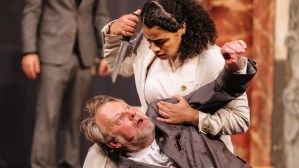”Julius Caesar” at the RSC and on tour review – ‘bizarre bonanza of ideas’

To call it a Marmite show would be something of a disservice to Marmite, which at least has a clear USP and doesn’t really care one way or another whether you love it or hate it. Atri Banerjee’s production, by contrast, seems desperate to be loved, either for or in spite of its wilfully challenging and radical choices.
This is unquestionably a director’s show, chock full of visual imagery, stylistic devices and wacky tangents. Some might call them gimmicks. The result is a production that bears some resemblance to Shakespeare’s great political conspiracy, yet oddly leaves the actors with nowhere to go, constrained by the director’s and the designers’ concepts and, it appears, with little steering on the real substance of the work – the text – despite the presence of two dramaturgs.
In Rosanna Vize’s set, we are offered a five-metre revolving cube, one side of which serves as a projection screen for Adam Sinclair’s distracting monochromatic animations, the others as various glimpses of some anodyne suite of offices where the dead accumulate to linger and haunt the living. On the apron, the action plays out in a kind of stylised physical theatre melange, with hands substituting for daggers, black oil for red blood and the Soothsayer (a clear and bright-eyed Annabel Baldwin) for the mob.

© The RSC / Marc Brenner
There’s no shortage of concepts but they rarely seem to hang together and are too frequently not fully explored. Ideas are thrown away as easily as the lines. The black blood, for instance, looks impressive but is never referenced or explained. Is it a comment on the fossil fuel industry, climate change, or simply a shortage of stage blood supplies? The result, coupled with Vize and Tomas Palmer’s modern-day, middle-manager costumes, is that it looks like the entire Roman senate is engaged in dealing with an unfortunate incident in the photocopier room.
What’s most disappointing is the absence of any sense of power. Caesar’s hold over the masses is glossed over almost in passing, while the machinations of his lieutenants and their internal wrangling with their consciences are so slight as to be almost non-existent. Mark Antony (William Robinson) is a lightweight, with nowhere near enough manipulative cunning to win over the people, and Thalissa Teixeira’s Brutus and Kelly Gough’s Cassius bicker inconsequentially before falling on their swords – sorry, hands.
It’s a shame that the RSC has selected this production to tour the nation. It does neither the company nor Shakespeare any great favours as an introduction to newcomers, not least in its resolute avoidance of the lyrical metre of the verse, which conveys so much of the majesty and meaning. Some will applaud its bravery and boldness; others will decry it as a travesty. The decision, as they say, is yours.














